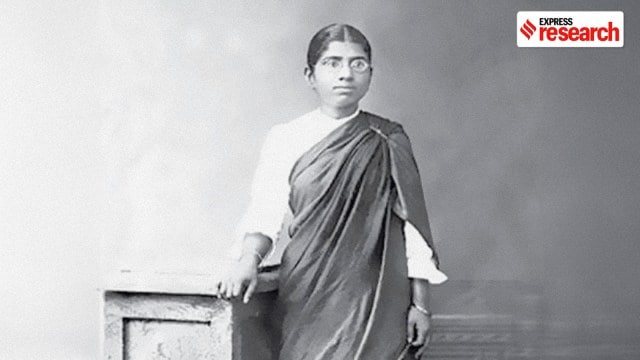For much of her early 20s, Muthulakshmi Reddy resisted the idea of marriage. As she recalled in her memoir, cited by historian Geraldine Forbes in The New Cambridge History of India: Women in Modern India (1996), “I had even then set my heart upon something high, and I wanted to be a different woman from the common lot.”
However, by the time she was 28, Muthulakshmi found herself compelled to marry, though on her own terms. She set forth certain conditions, including that her future husband would “always respect her as an equal” and “never cross her wishes.” Her progressive outlook was clear, and it is no surprise that she was ahead of her time. Muthulakshmi Reddy was the first woman legislator in British India and the first woman medical graduate in the Madras Presidency.
This is the story of a person who dedicated her life to improving the condition of women in colonial India. “I was neither a politician nor was I interested in politics except what directly concerned women’s life,” she wrote.
Story continues below this ad
Muthulakshmi’s early years
Muthulakshmi Reddy was born in 1886 in the Princely State of Pudukkottai. Her father, S Narayanaswamy Iyer, a Brahmin, was married to Chandrammal, who hailed from the Isai Vellalar caste—traditionally a group in which women were dedicated to dancing and singing in Hindu temples. Of their surviving children, Muthulakshmi was the eldest, with a younger brother and two sisters.
Narayanaswamy Iyer, who served as the Principal of Maharajah’s College in Pudukkottai, was deeply impressed by his daughter’s intellectual curiosity from a young age. Owing to the encouragement of her teachers, she continued her formal education until the age of 13, successfully passing the Lower Secondary Public Examination. Upon reaching puberty, she was required to leave school but continued homeschooling under the guidance of her father.
In 1902, Muthulakshmi sat for the Matriculation Examination and passed. As noted by M Kamatchi in the journal article Muthulakshmi Reddy: The First Medical Woman Professional in South India (2016), Muthulakshmi, in her application for admission to the Fine Arts Course, stated that she was “eager to commence the collegiate course.” However, her admission was met with resistance.
The college principal feared that her presence would ‘demoralise’ the male students, suggesting that she be placed in a separate room with a separate lecturer. The Maharajah of Pudukkottai, a progressive leader, dismissed this objection and granted her admission. Thus, Muthulakshmi became the first female student to attend the Maharajah’s College, from where she passed her Intermediate in 1907. While her father had envisioned her becoming a school teacher, she had her own aspirations.
Story continues below this ad
Impressing her professor at Madras Medical College
From an early age, Muthulakshmi harboured a deep desire to study medicine, inspired by two personal experiences: her childhood battles with illness and her mother’s struggle with typhoid. After her Intermediate examination, she entered Madras Medical College in 1907.
Her dedication and performance quickly caught the attention of Colonel Gifford, a Senior Professor and Surgeon at the Government Hospital for Women and Children in Madras. Impressed by her abilities, he allowed all female students to attend his lectures from that point onward. Muthulakshmi graduated with honours in 1912, becoming the first female medical graduate in the Madras Presidency. In recognition of her achievement, Colonel Gifford appointed her as a House Surgeon, acknowledging that no woman had previously held the position at the hospital.
In 1913, Muthulakshmi took on another role as the Residential Doctor for Subbalakshmi Ammal’s Brahmin Hostel for Widows. The following year, at the age of 28, she married Dr D T Sandara Reddi in accordance with the 1872 Native Marriage Act, as noted by Forbes. After their marriage, Dr Reddi served as the Chief Medical Officer at the Pudukkottai Government Hospital, and Muthulakshmi joined him in his work.
During her years in college, Muthulakshmi met Sarojini Naidu and began attending women’s meetings, which had a lasting impact on her. Under Naidu’s influence, she became one of the early members of the Women’s Indian Association (WIA), an organisation founded in 1917, alongside prominent Irish suffragists. Key members of the WIA included figures like Annie Besant and Margaret Cousins.
Story continues below this ad
Despite her demanding medical career and family life, Muthulakshmi also made time for social work and advocacy. As a medical practitioner, she published numerous booklets in English and vernacular languages, focused on the care of pregnant women, childbirth, and feeding infants. She also critiqued traditional birthing methods, which often involved untrained attendants, confinement to dark rooms, and isolation from others for several days. She advocated for better postnatal care and safer delivery practices.
In 1925, Muthulakshmi received a prestigious scholarship from the Government of India to pursue postgraduate studies in women’s and children’s diseases in England. On her return journey, she attended the Paris International Congress of Women as a delegate from India.
Speaking up for pregnant women, devadasis, prostitutes
Muthulakshmi Reddy’s name was included in the list of prominent social workers submitted to the Legislative Council by the WIA. Initially, she deferred the nomination, citing the demands of her medical career. However, in 1926, she was nominated to the Madras Legislative Council and chose to accept, eager to represent “her sisters” and voice their causes. From 1926 to 1930, she served as a member of the Legislative Council of British India, becoming the first woman ever to be appointed to it.
Story continues below this ad
In the Council, she passionately championed the rights of untouchables and devadasis while advocating for women’s legal rights. During her first year in the Council, Muthulakshmi focused on advancing women’s education. She highlighted the overcrowding of schools and the widespread eagerness of families to send their daughters to school. She pointed out the shortage of women teachers, attributing it to the lack of training schools and colleges in more backward areas. Muthulakshmi also emphasised that only Madras and Punjab had women deputy directors overseeing the establishment of new schools.
Muthulakshmi’s advocacy extended beyond education. In the 1929-1930 Budget Session, she raised the issue of appointing women medical officers in maternity hospitals across the Madras Presidency. She argued that most female patients preferred to be attended to by women practitioners, both during prenatal and postnatal care, yet the hospitals only employed male doctors. As a social worker, she also supported birth control, and the sixth session of the All India Women’s Conference (AIWC) passed a resolution to form a Committee of Medical Women to recommend ways to educate the public on regulating family sizes.
In addition to her work in healthcare, Muthulakshmi spoke out against practices like purdah (the veiling of women) and the exploitation of devadasis and prostitutes. She believed that the system of veiling was rooted in an unfounded fear that granting women freedom would lead them to become “unchaste and disloyal.”
As noted by Aparna Basu and Bharati Ray in Women’s Struggle: A History of the All India Women’s Conference 1927-2002 (2003), Muthulakshmi made two significant points regarding prostitution. She argued that the term ‘prostitute’ applied to both men and women and called for the punishment of men who abetted or benefited from prostitution. Regarding devadasis (women dedicated to the worship and service of Hindu temples), she introduced a Bill in the Madras legislature in 1927 to prohibit their service to temples, hoping this would allow them to lead more dignified lives as wives and mothers.
Story continues below this ad
Muthulakshmi was also a staunch advocate of adult franchise, not motivated by political expediency but by a sense of moral righteousness. “Our cause is righteous,” she believed. Muthulakshmi contended that using wifehood as a criterion for women’s voting rights was nonsensical in a society where property-owning male patriarchs had complete control over their wives. As Forbes notes, Muthulakshmi argued that enfranchising the wives of property owners would only “double the vote of conservative, orthodox men, generally opposed to all reforms in society.”
She also dismissed the notion of reserved seats for women, seeing them as ineffective when women in power were undeserving or unqualified. She famously stated, as Forbes recorded, “Women are still new to the public work here and unless we have chosen women of character, grit, and courage to occupy places of honour and responsibility, women cannot help to achieve much.”
A non-Brahmin herself, Muthulakshmi understood the intersection of caste and gender in India’s social struggles. As historian Mrinalini Sinha notes in Refashioning Mother India: Feminism and Nationalism in Late-Colonial India (2000), Muthulakshmi stated that the “only way to bring the Brahmans, the women and the pariahs together on a common platform is by enfranchising the women and the depressed classes on equal terms with others. If the women and the depressed classes are given freedom, power and responsibility, I am sure that they would very soon learn how to rectify the present social evil.’”
Further reading:
- Muthulakshmi Reddy: The First Medical Woman Professional in South India by M Kamatchi
- Refashioning Mother India: Feminism and Nationalism in Late-Colonial India by Mrinalini Sinha
- The New Cambridge History of India: Women in Modern India by Geraldine Forbes
- Women’s Struggle: A History of the All India Women’s Conference 1927-2002 by Aparna Basu and Bharati Ray

































